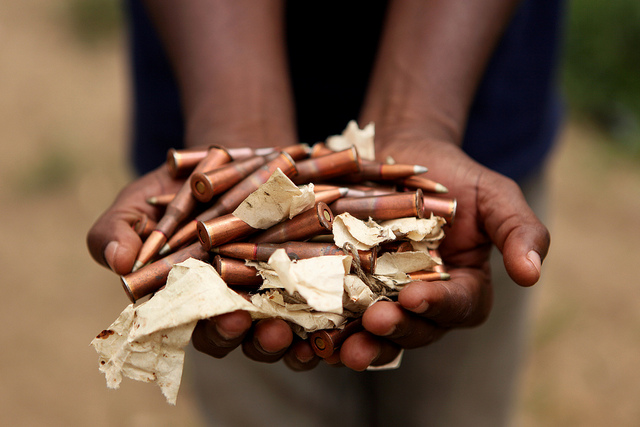“The world is becoming less peaceful”
June 18 A Global Peace Index survey ranks Nigeria among the least peaceful countries in the world, writes Tayo Elegbede, a Commonwealth Correspondent from Lagos, Nigeria. The same survey indicates that internal conflict is on the increase, and offers advice on homicide rates.
A Global Peace Index survey ranks Nigeria among the least peaceful countries in the world, writes Tayo Elegbede, a Commonwealth Correspondent from Lagos, Nigeria. The same survey indicates that internal conflict is on the increase, and offers advice on homicide rates.
A new survey rates Nigeria as the 14th least peaceful country in the world and puts it in the ranks of countries like Chad, Yemen, Libya, Syria, and Pakistan amongst other conflict-ridden states.
Nigeria ranked at 148 out of the 162 countries evaluated on the Global Peace Index for reduction of violence and insecurity between 2012 and 2013.
According to the publisher of the Index, the Institute for Economics and Peace (IEP), “The world has become a less peaceful place”.
The 2013 Global Peace Index ranks 162 countries by measuring security in society, the extent of conflict, and the degree of militarisation. This year’s report reinforces a longer-term pattern they have noted: since 2008 levels of peace have fallen by five per cent.
The report highlighted that while the number and intensity of internal conflicts has risen in recent years, hostility between states has fallen.
In Nigeria, this is evident in the multitude of mindless killings and bombings in the North, untamed manhunt and kidnapping in the South, endless violence in the East and gross human molestation and abuse of fundamental rights in the West. From 2007 to date, Nigeria has consistently ranked low in the index, signifying a poor state of the nation in terms of peace and security over the past six years. The country was 117th out of 121 in 2007; 129th out of 140 in 2008; 129th out of 144 in 2009; 137th out of 149 in 2010; 142nd out of 153 in 2011; 146 out of 158 in 2012.
Recently, a New York-based Human Rights Watch said about 3,600 deaths have been recorded since a radical sect dubbed Boko Haram began violent operations in the Northern region of the country in 2009. The government is now waging war against the insurgents through an emergency rule.
With this rating as the 14th least peaceful country in the world, Nigeria, Africa’s most populous nation and the world’s eighth largest oil producer, has much to contend with in order to achieve its developmental goals.
The global outlook indicates a dramatic rise in the number of homicides and more countries increasing their military expenditure as a percentage of the GDP. Both were cited as key drivers in making the world a less peaceful place, according to the 2013 GPI. This year’s findings were said to underline a six-year trend showing a deterioration of five per cent in global peace. It indicated that 110 countries have seen their score deteriorate while only 48 became more peaceful. The economic impact of this five per cent loss in peace came at a cost to the global economy of US $473 billion last year, or the equivalent to almost four times the Official Development Assistance (ODAs) in 2012, it unveiled.
The sharp increase in the number of homicides – up eight per cent over the last year – can be almost entirely attributed to Latin America and Sub-Saharan Africa. The homicide rate in Honduras for example further increased by almost ten per 100,000 people to become the highest in the world at 92 homicides per 100,000 people, the 2013 GPI revealed.
“The migration of populations to urban areas in developing countries has been a key driver in the rise of homicides worldwide,” said Steve Killelea, founder and Executive Chairman of the IEP.
“This has also led to an increase in violent crime. It is essential for the police to gain the trust of those living in city slums, to achieve this; addressing police corruption would be a first important step”.
Tayo Elegbede is a Freelance Journalist with Local and International news firms.
Follow him on twitter @tayojet1
photo credit: United Nations Photo via photopin cc
…………………………………………………………………………………………………………………
About me:
I am a young broadcast journalist, radio presenter, writer, public relations practitioner and social entrepreneur with a passion for all-round human development. My core philosophies in life include honesty and integrity, open-mindedness, responsibility and accountability.
…………………………………………………………………………………………………………………
Opinions expressed in this article are those of the author and do not necessarily represent the views of the Commonwealth Youth Programme. Articles are published in a spirit of dialogue, respect and understanding. If you disagree, why not submit a response.
To learn more about becoming a Commonwealth Correspondent please visit: http://www.yourcommonwealth.org/submit-articles/commonwealthcorrespondents/




